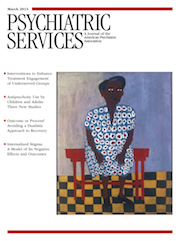Improving Treatment Engagement of Underserved U.S. Racial-Ethnic Groups: A Review of Recent Interventions
Abstract
Objective
Unequal mental health among U.S. underserved racial-ethnic populations has become a prominent national concern. Contributing to this inequity is our limited ability to engage individuals from underserved populations into treatment. To help address this, a systematic literature review was conducted to examine the evidence base for interventions that can improve mental health treatment engagement among underserved racial-ethnic minority populations.
Methods
A MEDLINE search and bibliographic review yielded 1,611 studies that were reviewed according to several inclusion criteria: publication during or after 2001, U.S. adult sample, a randomized design, sufficient (≥50%) representation of underserved racial-ethnic groups, adequate sample size (≥27 participants per condition), explicit focus on mental health treatment engagement, and evaluation of an engagement outcome (for example, adherence or retention).
Results
Ten studies met inclusion criteria. Evidence supported the efficacy of collaborative care for depression as an engagement enhancement intervention among underserved racial-ethnic populations. Several other interventions demonstrated possible efficacy. The effect of the interventions on clinical outcomes, such as symptom improvement and rehospitalization, was mixed.
Conclusions
Collaborative care for depression can be recommended for improving engagement in depression care in primary care among underserved racial-ethnic populations. Future research should continue to examine approaches with initial evidence of efficacy in order to expand the number of engagement enhancement interventions for underserved racial-ethnic adult populations. Additional issues for future engagement research include relative intervention efficacy across racial-ethnic groups, inclusion of other understudied groups (for example, Asian Americans and Native Americans), and greater clarification of the impact of improved engagement on clinical outcomes.




